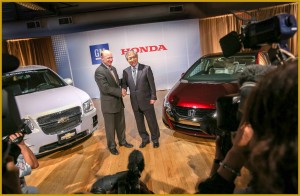General Motors and Honda will co-develop a new fuel cell system along with hydrogen storage techniques. They are convinced that fuel cell technology is one of the solutions, perhaps the ultimate solution, to achieve zero emissions.
The two companies are, arguably, the most knowledgeable in the automotive world on what has so far been wildly impracticable applications of the space age technology. GM and Honda have more patents in the area of fuel cell technology than any other automakers. It is claimed that circa 2020 affordable fuel cell electric vehicles will result from the joint venture.
The joint-venture announcement last week mirrors previous ones from a JV among Ford Motor, Renault-Nissan and Daimler, this one claiming affordable, mass-market fuel-cell vehicles by 2017. BMW and Toyota also have a joint venture to develop fuel cells. (Read AutoInformed on: BMW and Toyota to Jointly Research Lithium Ion Batteries; BMW; Toyota Sign Deal for Joint Fuel Cell and Battery Programs)
The light duty fuel cell vehicle (FCV) has shown promise for decades, but the problem remains that it is space age technology at NASA levels of cost. Not surprisingly, automakers have varying levels of interest in fuel cells that always appear to be just a decade or so from commercialization, but interest is rising.
GM’s second-generation fuel cell Equinox EV runs on electricity created by an on-board fuel cell stack similar to ones used in the space program and almost as expensive. The U.S. Department of Energy estimated in 2008 that in volume production electricity would be made at $73 a kilowatt. A kilowatt of electricity in Michigan for residential customers currently costs 15 cents or less. GM’s Project Driveway program, launched in 2007, has accumulated nearly 3 million miles of real world driving in a fleet of 119 hydrogen-powered vehicles, more than any other automaker.
Honda has a long history of developing environmental technologies and has played a significant role in reducing pollution, fuel consumption and CO2 emissions. Ten years ago, the Honda FCX became America’s first fuel cell electric vehicle available to individual customers and the Honda FCX Clarity fuel cell electric sedan debuted in 2008, scheduled for launch in 2015, with a concept model debuting later this year.
A “Pike Pulse Report: Light-Duty Fuel Cell Vehicles” evaluates ten automakers working on fuel cell vehicles and rates them on 12 criteria for strategy and execution, including go-to-market strategy, product portfolio, partnerships, innovation, reach, market share, pricing, and staying power. An Executive Summary of the report is available for free download on the firm’s website.
See:


